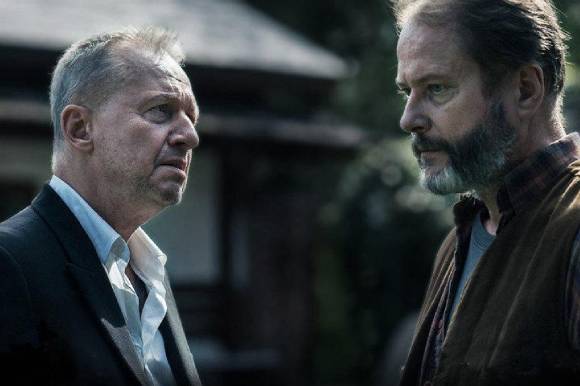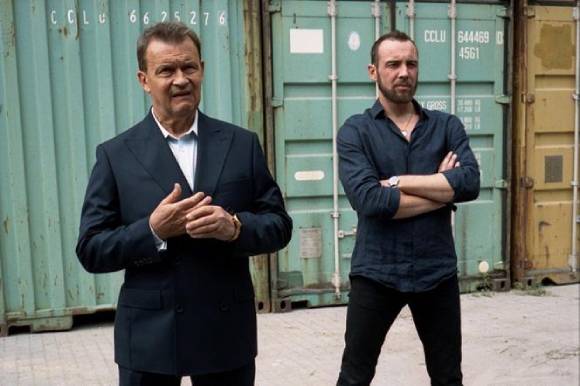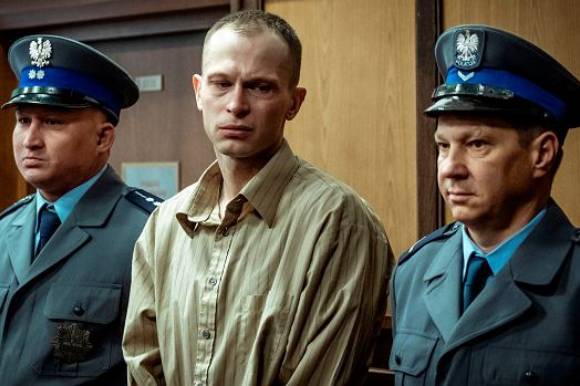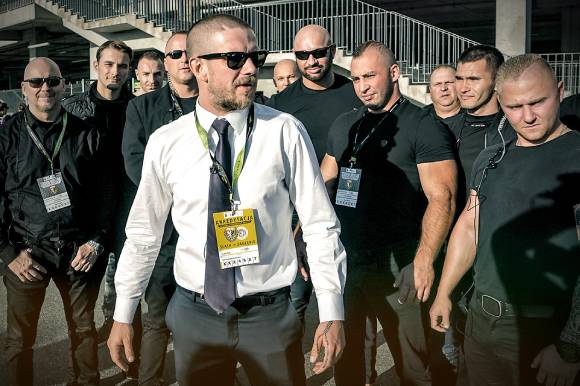 MARKET ANALYSIS 2020
MARKET ANALYSIS 2020
WARSAW: The year 2020 was successful for Polish cinema abroad despite the difficult circumstances. A number of prestigious awards and nominations consolidated the strong position of Polish cinematography. Several local and international productions used the 30% cash rebate. The film community was put to a test by the Coronavirus pandemic, but it was able to organise itself with the support from the Polish Film Institute and other Polish film institutions, and to navigate in the pandemic crisis.
PRODUCTION
Poland produced over 30 feature films in 2020, most of them supported by the Polish Film Institute (PISF). A total of 23 feature film projects received support, with the biggest grants of 1.07 m EUR / 5.93 m PLN going to Biała Odwaga, a new drama from Marcin Koszałka, produced by Balapolis, and 1.1 m EUR / 5.1 m PLN to Pani od polskiego by Radosław Piwowarski, produced by WFDiF. Both films started shooting in 2020.
The Peasants / Chłopi directed by Dorota Kobiela and based on the Nobel prize winning novel by Władysław Stanisław Reymont started production in the spring of 2020. This new project from BreakThru Films animation studio, known for Loving Vincent and Peter and the Wolf, received 863,343 EUR / 4 m PLN of funding from PISF. The film will be realised in the painting animation technique, which was highly praised in Loving Vincent. The premiere is planned for 2022 and the film will be released in Poland by NEXT FILM.
In 2020 the Polish Film Institute supported nine minority coproductions, of which the biggest grant of 431,671 EUR / 2 m PLN was received by Zone of Interest, directed by Johnathan Glazer with Extreme Emotions Bis as the Polish coproducer. The upcoming Holocaust drama produced by Studio A24 (UK) will be shot in Poland with the involvement of Polish talent in 2021. The shoot was planned for 2020, but was postponed due to the COVID-19 pandemic.
The Brutalist directed by Brady Corbet and coproduced by Madants received the same amount of funding. The production started in Poland in January 2021. The Brutalist is an American/Polish coproduction between Andrew Lauren Productions (USA), Three Six Zero Bookstreet Pictures (USA), Killer Films (USA) and Madants (Poland).
Oleg Sentsov’s new drama Rhino / Nosorożec received 232,558 EUR / 1 m PLN from the Polish Film Institute. The Ukrainian director is once again teaming up with Warsaw-based Apple Film Production, coproducing with Arthouse Traffic (Ukraine) and Cry Cinema (Ukraine), which is a company founded by Oleg Sentsov in 2008. The shoot for the film launched in the Ukraine in July 2020.
In 2020 the Polish Film Institute also supported seven microbudget productions directed by first or second time directors, granting 128,418 EUR / 595,000 PLN to each project. The planned  budgets of all of them are 151,077 EUR / 700,000 PLN.
budgets of all of them are 151,077 EUR / 700,000 PLN.
Seven productions received funding from the Polish-German Coproduction Fund. The biggest grant of 93,200 EUR went to The Delegation by Asaf Saban, coproduced by In Good Company GmbH and Koi Studio. Currently in production, The Delegation follows Israeli teenagers on a school trip to concentration camps and memorials around Poland.
COVID-19 GOVERNMENT SUPPORT
In March 2020, in response to the epidemic threat and the dramatic situation in which Polish cinematography found itself, the Director of the Polish Film Institute Radosław Śmigulski appointed a task force to deal with the crisis in the film industry. This crisis team included representatives of various film circles. The Director also published an appeal in connection with the state of epidemic emergency introduced by the government. The production of films and series was temporarily interrupted or suspended.
On the other hand, the amount of the grant funds in the Project Development programme was increased. The crisis group agreed on the need to extend the period of financing promises already granted by PISF up to three years. The producers were obliged to distribute long films supported by PISF in cinemas and they could choose to launch them online during the pandemic.
All domestic films had their classification switched to "difficult", which would allow to raise the threshold for public aid to 70%. PISF would also implement a quick information path on awarded grants. Producers who receive a grant for development would get a bigger amount of funds in the first installment, which was increased to 70% of the grant.
The closure of cinemas in March 2020 sparked a #supportPolishcinemas campaign, during which viewers could support local cinemas all over Poland by purchasing voucher tickets online.
A financial support programme for filmmakers was established on 7 April 2020 by the Director of the Polish Film Institute in cooperation with the Polish Filmmakers Association, the Polish Film Academy, the Guild of Polish Directors and the Association of Artists for Rzeczpospolita.
The Polish Filmmakers Association (SFP) allocated over 6.5 m EUR / 30 m PLN as part of an assistance package to support filmmakers during the COVID-19 pandemic crisis. This is one of the largest amounts of support provided by creative organisations to its members during the pandemic.
In May 2020 the Polish Producers Alliance (KIPA) and Netflix launched a fund to assist the employees of the Polish film and television industry who were most affected by the suspension of work due to the COVID-19 pandemic. Netflix donated 551,000 EUR / 2.5 m PLN towards the fund's launch. The fund was designed to support the crews in the television and film sectors who were most affected by the pandemic, who often work as freelancers and were now unable to be professionally active due to the almost complete halt of work on film sets.
 Also in May 2020, the Studio Cinemas Association launched the largest virtual cinema in Poland www.mojeekino.pl, uniting 47 studio cinemas, where not only film screenings, but also meetings with filmmakers and film festivals took place.
Also in May 2020, the Studio Cinemas Association launched the largest virtual cinema in Poland www.mojeekino.pl, uniting 47 studio cinemas, where not only film screenings, but also meetings with filmmakers and film festivals took place.
In October 2020 the Polish Government approved an additional 27 m EUR / 120 m PLN in support from the COVID-19 Counteracting Fund to help the cinema industry.
DISTRIBUTION
The leading distributors of mainstream cinema on the Polish market are Kino Świat, SPI International Polska, NEXT FILM and Monolith Films. The art house market is dominated by Gutek Film and Against Gravity.
Similar to 2019, two films by Patryk Vega boasted major success on markets outside Poland. Vega's look at the scandalous world of soccer entitled Bad Boy was released by Kino Świat in Poland in February 2020, while in March 2020 Kinostar Filmverleih released it in Germany, the Netherlands, the UK, Belgium, Sweden, Austria, Switzerland and France.
Patryk Vega's action crime drama The Noose / Pętla, based on a true story about a second generation cop who has designs on becoming a detective but descends into bribery, corruption and addiction, opened in Poland on 4 September 2020 distributed by Kino Świat. In the same month Kinostar Filmverleih released it in the UK, Lithuania and Germany. Both films were produced by the director’s company Vega Investments.
Corpus Christi by Jan Komasa follows Vega's films in terms of the number of territories where it went into distribution. The drama nominated for the Academy Award in the International Feature Film category was sold to over 45 territories and it was released in 2020 in the Netherlands (IMG Films), France (Bodega Films), Norway (Fidalgo), Romania (Bad Unicorn), Portugal (Films4You), Slovakia (ASFK), the Czech Republic (ACFK), Iceland (Bíó Paradís) and Lithuania (Europos kinas).
Corpus Christi also received four nominations for the European Film Awards in the following categories: Best Film, Best Screenplay (Mateusz Pacewicz), Best Actor (Bartosz Bielenia) and Best Director (Jan Komasa). The film was produced by Aurum Film in coproduction with Canal+, WFS Walter Film Studio, the Podkarpackie Regional Film Fund and Les Contes Modernes  (France), with support from the Polish Film Institute.
(France), with support from the Polish Film Institute.
Agnieszka Holland also received an EFA nomination for Charlatan / Šarlatán, produced by Marlene Film Production in coproduction with Film and Music Entertainment (Ireland), Madants (Poland), Furia Film (Slovakia), the Czech Television, Barrandov Studio and RTVS. The film opened in the Czech Republic and Slovakia on 20 August 2020, distributed by UPI, and in October 2020 in Poland (Gutek Film) and Hungary (Mozinet). In November 2020 the film opened in New Zealand, distributed by Vendetta Films.
The biggest Polish domestic distribution success in 2020 was 365 Days directed by Barbara Białowąs and Tomasz Mandes, based on a script by Tomasz Klimala, who adapted a bestselling series written by Blanka Lipińska. The film was produced by Ekipa in coproduction with TVN and NEXT FILM.
365 Days opened in Polish cinemas on 7 February 2020, distributed by NEXT FILM, and had 1.64 m admissions. The film also had a broad UK distribution, where it premiered on 14 February 2020, cashing in 7.9 EUR in both markets.
365 Days was also the most-watched film on Netflix around the world in 2020. 365 Days received Amber Lions for the most popular film of the year at the 45th Polish Film Festival in Gdynia.
VOD DISTRIBUTION
On-demand services are becoming more and more popular in Poland. According to the November IRCenter report Multiscreening 7. World of New Media, as much as 74% of Poles paid for VoD content in 2020, while in 2019 the percentage was only 44. In the 15-24 age group, the percentage is 82%. The most preferred (by 57%) form of using on-demand services currently are monthly packages, especially popular in the above-mentioned age group.
According to the Mediapanel study by Gemius / PBI, in 2020 Netflix became a clear leader, with nearly seven million users in Poland in January 2021. CDA Premium, owned by the listed CDA company, came second among the most popular streaming services in Poland, with 3.87 m users. CDA Premium is also the only company in the forefront that is not backed by any major media groups. The top 5 most popular services in Poland also include www.vod.pl, TVP VOD and HBO GO.
In May 2020 CANAL+ launched its own VOD platform available on Android and iOS devices. The service offer is divided into four paid packages and one free package for all users.
 In December 2020 a new platform Fixmojo debuted on the Polish market, offering classic films and TV series.
In December 2020 a new platform Fixmojo debuted on the Polish market, offering classic films and TV series.
EXHIBITION AND BOX OFFICE
Poland has over 1,200 cinema screens, of which 80% are operated by big multiplex cinema chains. The leading companies are Cinema City with over 30 multiplex cinemas, 380 screens and 110,000 seats, Helios with 42 cinemas and 49,000 seats, and Multikino with 48 cinemas and 70,000 seats. Additionally, there are more than 600 one-screen cinemas.
The good streak of the film distribution market in Poland was interrupted in 2020, due to the Coronavirus pandemic. The closings and re-openings of cinemas, the reduction of the number of seats to 50% and even to 25% in October 2020, the impossibility to plan advertising campaigns for films, postponed a large number of American titles or sent them directly to streaming, thus negatively affecting most of the key indicators.
In 2020 the cinema attendance in Poland was less than 30% of the attendance in 2019, which translated into a decrease from 60.9 m to 17.1 m admissions. The revenues amounted to less than 71.2 m EUR / 331 m PLN.
A total of 169 titles debuted in cinemas, which is practically half as many as in 2019. The average ticket price decreased slightly from 4.04 EUR / 18.78 PLN in 2019 to 3.94 EUR / 18.30 PLN in 2020.
Seven out of the ten most watched films were domestic productions. Among them, three surpassed 1 m admissions: the erotic thriller 365 days by Barbara Białowąs, produced by Ekipa in coproduction with TVN and NEXT FILM, and released by NEXT FILM on 7 February 2020 (1,639,390 admissions); Władysław Pasikowski’s Dogs 3, produced by Scorpio Studio and released by Kino Świat on 17 January 2020 (1,185,030 admissions), and the second film by Maciej Kawulski How I Became a Gangster. A True Story, produced commercially by NEXT FILM and Polsat, which opened on 3 January 2020 distributed by NEXT FILM (1,136,056 admissions).
 The comedy Mayday directed by Sam Akina and distributed by Kino Świat had 977,000 admissions. The next two positions are occupied by Jan Holoubek's debut feature 25 Years of Innocence. Tomek Komenda's Case, produced by TVN (711,762 admissions), and The Noose by Patryk Vega produced by Vega Investments (569,689 admissions). Both films were distributed by Kino Świat.
The comedy Mayday directed by Sam Akina and distributed by Kino Świat had 977,000 admissions. The next two positions are occupied by Jan Holoubek's debut feature 25 Years of Innocence. Tomek Komenda's Case, produced by TVN (711,762 admissions), and The Noose by Patryk Vega produced by Vega Investments (569,689 admissions). Both films were distributed by Kino Świat.
Zenek by Jan Hryniak, produced and distributed by TVP, had 507,719 admissions. The second half of the box office includes two animated films for children - Rascal with 568,436 admissions, and the US blockbuster Scooby-doo! with 444,933 admissions. The war drama 1917 came in 10th with 423,924 admissions.
GRANTS AND NEW LEGISLATION
The Polish Film Institute is the largest source of funding with additional funds coming from the television, a well-developed network of regional film funds, as well as private sources. The most frequent coproduction partners for Poland are Germany, France and the Czech Republic, with growing involvement of the Scandinavian countries, including Sweden and Denmark.
The average budget of a Polish production is approximately 930,000 – 1.1 m EUR / 4 - 4.5 m PLN.
In 2020 PISF granted over 18.3 EUR / 85 m PLN to 50 audiovisual projects as part of the cash rebate scheme. Among the co-financed projects there were 20 domestic productions, 14 international productions and 16 international coproductions. The total Polish budget for all projects (funds to be spent in Poland) is nearly 86.1 m EUR / 400 m PLN.
The 30% cash rebate incentives for filmmakers were introduced in February 2019 based on the Act of 9 November 2018 on financial support for audiovisual production. The system offers reimbursement of production costs incurred in Poland in the amount of up to 30% of Polish eligible expenses. It is a systemic solution whose primary task is to support audiovisual production in Poland. The funds come directly from the state budget, and the programme is managed by the Polish Film Institute.
 Click HERE for more information on Poland’s cash rebate.
Click HERE for more information on Poland’s cash rebate.
In July 2020 Poland introduced a levy for on-demand audiovisual media services as part of the anti-crisis shield 3.0. The levy amounts to 1.5 percent coming either from user fee income or ad revenue, whichever is higher for the individual business. The levy must be paid each quarter to the Polish Film Institute. Digital companies operating in Poland paid 1.986 m EUR / 8.92 m PLN in the first six months since the new VOD levy was introduced.
Poland has a well-developed network of regional film funds with 11 active funds: Łódź FF, Gdynia FF, Silesia FF, Lower Silesia FF, Poznań FF, Podkarpackie FF, Krakow FF, West Pomerania FF, Lublin FF, Mazovia FF and Warmia and Mazury Regional Film Fund.
The Polish Filmmakers Association (SFP) has over 1,700 members. The SFP is involved in the organisation of film events including festivals and major markets. Munk Studio – Polish Filmmakers Association, which operates within the structure of the SFP, produces short films and debut features made by young filmmakers. Polish producers are members of the Polish Producers Alliance (KIPA) established in November 2000 to protect “the economic and legal interests of the Polish audiovisual sector”. The Polish market also has a very active network of film commissions for the the Lower Silesia, Małopolska, Mazovia, Silesia and Podkarpackie voivodships, and in the cities of Łódź and Poznań.
TV
In 2020 the public broadcaster TVP took the first place among the most popular TV stations in the whole year. The average daily share of this channel decreased by 0.23% percent compared to 2019 and amounted to 9.66 percent of the market share.
 Polsat is the first runner-up and its share in the analysed period decreased by 15.21% to 8.34 percent. The third place belongs to TVP2. In 2020 the station’s share of the market amounted to 7.50%, after a decline compared to the same period in 2019. TVN took the next place with 7.49 percent (down by 11.42%). The total share of the so-called "big four" decreased from 36.26% in 2019 to 33.01% in 2020, which is the worst result for these key players in recorded history.
Polsat is the first runner-up and its share in the analysed period decreased by 15.21% to 8.34 percent. The third place belongs to TVP2. In 2020 the station’s share of the market amounted to 7.50%, after a decline compared to the same period in 2019. TVN took the next place with 7.49 percent (down by 11.42%). The total share of the so-called "big four" decreased from 36.26% in 2019 to 33.01% in 2020, which is the worst result for these key players in recorded history.
The year 2020 saw a rise of the news stations, with TVN24 coming 4th with 5.36% market share, followed by TVP INFO with 4.83%.
In November 2020 the public broadcaster TVP launched a new thematic channel TVP Dokument, presenting TVP’s own flagship documentary productions (available from January 2021), through Weekends with the BBC, productions in the genre of factual entertainment, premium films on the subjects of nature, travel, popular science and biographical courses.
CONTACTS:
POLISH FILM INSTITUTE
Kruczkowskiego 2
00-412 Warsaw, Poland
Phone: +48 22 10 26 454
www.pisf.pl
This email address is being protected from spambots. You need JavaScript enabled to view it.
POLISH FILMMAKERS ASSOCIATION
Pańska 85
00-834 Warsaw, Poland
Phone.: (+ 48) 22 512 41 00
This email address is being protected from spambots. You need JavaScript enabled to view it.
www.sfp.org.pl
FILM COMMISSION POLAND
Kruczkowskiego 2
00-412 Warszawa
Phone: +48 22 102 64 42
This email address is being protected from spambots. You need JavaScript enabled to view it.
 FILM COMMISSIONS:
FILM COMMISSIONS:
WROCŁAW FILM COMMISSION
50-020 Wrocław, Piłsudskiego 64A, Poland
Phone: +48 71 793 79 72, +48 601 384 194
Fax: +48 71 79 400 88
This email address is being protected from spambots. You need JavaScript enabled to view it.
http://wroclawfilmcommission.pl/
ŁÓDŹ FILM COMMISSION
90-022 Łódź, Targowa 1/3, Poland
Phone: 48 42 600 61 33
This email address is being protected from spambots. You need JavaScript enabled to view it.
This email address is being protected from spambots. You need JavaScript enabled to view it.
www.lodzfilmcommission.com
KRAKOW FILM COMMISSION
31-311 Kraków, Wygrana 2, Poland
Phone: +48 12 354 25 53
This email address is being protected from spambots. You need JavaScript enabled to view it.
www.film-commission.pl
MAZOVIA WARSAW FILM COMMISSION
00-139 Warsaw, Elektoralna 12, Poland
Phone: +48 22 586 42 58
This email address is being protected from spambots. You need JavaScript enabled to view it.
www.mwfc.pl
POZNAN FILM COMMISSION
61-767 Poznan, Masztalarska 8, Poland
Phone: +48 61 8528833 ext. 35 Fax: +48 61 8528835
Fax: +48 61 8528835
This email address is being protected from spambots. You need JavaScript enabled to view it.
www.poznanfilmcommission.pl
SILESIA FILM COMMISSION
40-008 Katowice, Górnicza 5, Poland
Phone: +48 698 353 147
This email address is being protected from spambots. You need JavaScript enabled to view it.
PODKARPACKIE FILM COMMISSION
35-002 Rzeszów, Okrzei 7, Poland
Phone: +48 721 288 004
This email address is being protected from spambots. You need JavaScript enabled to view it.
www.podkarpackiefilmcommission.pl
KUJAWY POMORZE FILM OFFICE
Phone: +48 881 232 234
This email address is being protected from spambots. You need JavaScript enabled to view it.
www.film.kujawsko-pomorskie.pl
Report by Katarzyna Grynienko (2021)
Sources: the Polish Film Institute, the National Broadcasting Chamber



















